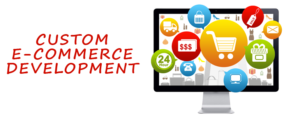 E-commerce industry players have two options. They can either go for an off the shelf platform (custom site with a premade template) or opt for a customized site designed as per the enterprise’s requirement. To stand out of the competition, small and large firms are opting for customized e-commerce solutions.
E-commerce industry players have two options. They can either go for an off the shelf platform (custom site with a premade template) or opt for a customized site designed as per the enterprise’s requirement. To stand out of the competition, small and large firms are opting for customized e-commerce solutions.
- Customization plays a crucial role in offering great user-experience
At times, you might come across multiple online shopping portals that have a similar boring theme. That’s because they use the same old ideas designed for masses.
Any expert would be able to point out that an interpretive sign of poor user experience is the portal’s high bounce rate. For improving the customer experience and conversion rate, the organization needs to customize the ecommerce site. Traffic coming from paid search engine ads needs to land on a customized landing page for high conversion rate. The portal may need to be optimized for skimming. You may also need to cut down on specific page elements to reduce the page loading time.
For making sure that the site always responds quickly, ecommerce portals that cater to a vast amount of traffic need to opt for a dedicated hosting server instead of a shared one. When your store starts expanding its business, you can consider scaling up the hosting space. The availability of cloud-based hosting solutions has made things easier for ecommerce development. With a customized website for e-commerce, you can quickly get the changes done, as and when required.
- Off the shelf, the platform may not support industry-specific needs
Some industries need to follow sector-based regulations. For example, an online pharmacy needs to manage highly specific operational procedures compared to what a meat-selling e-commerce portal follows. There are some state-specific regulations as well.
In some cases, customer’s credentials need to be verified before processing the order. There might be a need to store and capture data (for example, physician’s prescription) for further reference.
Consumers can come across some questions about the product while shopping. If unresolved, prospect might abort the shopping cart and leave the portal. So, an ideal ecommerce solution should enable firms to track the customer’s shopping cart and assist them with live chat support during different stages of the buying process.
Most importantly, all these processes need to be performed quickly. It would be wise to opt for a custom ecommerce solution that’s designed to follow the industry-specific standards for order processing, billing, shipping, etc.
You can select a company that offers ecommerce development services to cater to a wide array of clients’ needs. The tech-firm must have a highly skilled team experienced in developing customized ecommerce platforms for small and large businesses.
- Ability to customize the checkout process and payment gateway
Studies have already proved that slower and complicated checkout procedures can cause cart abandonment. With a generic e-commerce platform in place, firms cannot customize the checkout procedure as per business needs. Features like customer specific pricing, the ability to allow consumers to add coupon codes, and offering payment methods according to the customer’s geographical location are the need of the hour. Most importantly, the e-commerce platform also needs to display required as well as optional disclaimers during the checkout process. Currently, less than 40 percent of the e-commerce portals follow the appropriate procedures. Thus, the ability to customize the checkout process needs to be given the top priority.
No matter how impressive your online store appears and works, it is the site’s payment gateway that plays a crucial role in maintaining trustworthiness amongst customers.
Almost all ready to use portals support specific payment gateways and card processors. But, in the case of a custom-made option, you can implement the one that supports faster payment processing and charges lower transaction fees as well. It should also comply with PCI DSS guidelines.
- Customization helps in implementing a tailor-made SEO strategy
Effective digital marketing and SEO campaigns become necessary when a small firm enters the market dominated by larger competitors. A tailor-made strategy to make the portal search engine friendly can be easily implemented in case of a customizable website. For analyzing the website’s traffic during a specific time-frame, your marketing team would require a site that can cater to their unique data reporting needs. Thus, general marketing and SEO tools offered by off the shelf platforms won’t always prove useful.
- Customization makes system integration easy
Every business has multiple systems in place to manage various tasks. Seamless integration between these systems is crucial for the smooth functioning of the e-commerce portal. The website can be tailored to integrate with the company’s specific backend software, ERP or CRM and help in optimal utilization of the existing resources. You can opt for a reputed ecommerce development company to assist you with the integration process.











